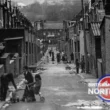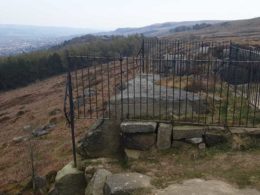Image: The historic Market Town of Hexham sits in the Tyne Valley in Northumberland. The skyline is dominated by the Abbey.
There is little recorded about the town we now call Hexham before the Anglo-Saxon period. Prior to the Roman occupation of Britain, the area was part of the northern dominion of the Celtic tribe the Brigantes but any settlement in the area was unrecorded by the Romans.
The first references to the settlement were when the Northern Angles took over this region of north-east Britain, the Old English names for what was to become Hexham were Hagustaldesea, later Hagustaldes ham.
The settlement fell under the control of the kingdom of Deira.In the year 604 AD the Anglian king Aethelfrith united the kingdoms of Deira and Bernicia and created the kingdom of Northumbria. In 633 AD King Cadwallon of Northumbria was killed near Rowley Burn, just south of Hexham by the earl Oswald, who became King of Northumbria.
The Christian church was by now established across Northumbria and Queen Aethlthryth granted land at the settlement to the church, Bishop Wilfrid of York, began work to build a monastery at Hexham between 674 and 678, which would become the focus for building Hexham Abbey. A Bishop of Hexham was duly appointed, Hexham became important to the early church in northern Britain, unfortunately this was to last barely 100 years.
However tensions between the northern Anglian aristocracy persisted and in 788 King Aelfwald was murdered by a nobleman called Sicga, the king was buried in the church at Hexham.
As mentioned above the bishopric of Hexham was not to last, in 821 a Danish viking warband raided Hexham and expelled Bishop Tilferth, he was to be the last Bishop of Hexham. Then 55 years later, 876 AD, Hexham was again attacked by the Danes, this time the town and the abbey was burned down and much of the population of the town were slaughtered. As Northumbria was absorbed into the Danelaw and ruled from York (Jorvik), slowly the town was re-established out of the ruins of the old.
After the Norman conquest of the North, life drifted on as before, this time under a Norman overlord and the church hierachy based in Durham.
Throughout the medieval period, Hexham was caught up in the border wars with the Scots, in 1297 William Wallace led a raiding army into Northumberland and Hexham was attacked and burned again. Then 15 years later Robert the Bruce led his Scots army south and this time the
monastery of Hexham paid off the Scots, a vast sum at the time of £2,000 from the church treasury so that ‘The Bruce’ did not burn the monastery or the town.
This peace was not to last and in 1346 King David 2nd of Scotland marched south and this time the Scots burned the monastery at Hexham.
In the Wars of the Roses, the Battle of Hexhham was fought in 1464, the 4,000 strong Yorkist army under John Neville, Lord Montagu, confronted the Lancastrian army of the Duke of Somerset at Hexham and destroyed the Lancastrian force, killing the Duke of Somerset.
Thereafter Hexham settled into three centuries of relative peace as a small market town. Until, in 1761 a notorious episode in the town’s history was the ‘Hexham Riot’, where local people challenged the laws on billeting, feeding and drafting men into the militia. A riot erupted when the North Yorkshire Militia entered the town to enforce the law, protests turned into a riot and the militia opened fire on the crowd killing a number of locals before order was restored.
From the 18th Century onwards, Hexham became noted as a centre of the leather trade, the preparation, tanning and working of leather goods, particularly leather gloves, most noted were so-called ‘Hexham Tans’.
Today Hexham can be classed as a White town, the most recent population data showing that Hexham is 98.4% White, mostly White British, a rare situation in 21st Century Britain.
The British Movement would love to receive articles for possible inclusion on this site from members and supporters across the North of England. Please remember that we have to operate within the laws of this country – we will not include any content that is against the current laws of the United Kingdom. News reports should be topical and be relevant to the regions covered by this website.












